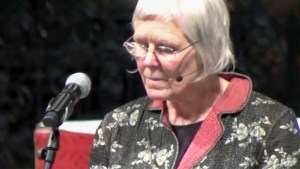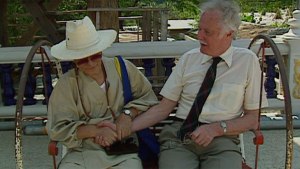In their new book, Choosing Forgiveness: Unleashing the Power of God’s Grace, Fr. Thomas Berg and clinical psychologist Dr. Timothy Lock diagnose a debilitating problem afflicting many: the inability to forgive. The authors also provide a road map to letting go of resentment that promises life-changing psychological and spiritual benefits. Aleteia talked to the authors about the new book, published by OSV.
In your book, Choosing Forgiveness: Unleashing the Power of God’s Grace, you explain how harboring resentments can have a detrimental effect one one’s emotional and spiritual health. How can we recognize the symptoms of this in ourselves?
Dr. Lock: There are direct ways, and indirect ways, that we manifest symptoms of resentment and unforgiveness. Anger is the most common “direct” symptom – seen in things like outbursts of anger, persistent annoyance, or general irritability. Other direct symptoms include being easily impatient or frustrated, being very critical, offering frequent negative comments, and being generally argumentative. Indirect symptoms are also very important to look for: withholding affection and expressions of love, interpersonal coldness or even giving someone “the silent treatment,” withholding support. Indirect symptoms are sometimes referred to as being “passive-aggressive.”
You write about the connection between forgiveness and freedom. How are they related?
Fr. Berg: Holding onto unforgiveness is like holding a beach ball underwater. The beach ball seems to develop a certain strength, and it looks for any opportunity to break free and catapult out of the water into the air. Like the strength it takes to keep a beach ball underwater, when we hold onto unforgiveness, we use a tremendous amount of internal resources and strength to ruminate and “stew” about the issues and the person who offended us. When we forgive, we are able to “let go” of that ruminating and stewing, and the person who offended us. This “letting go” allows us to relax and we can direct our resources and strength to other areas of our life. This is “easier said than done” so in the book we get into detail about how to do this. We have seen in the lives of those we encounter in ministry (Fr. Tom through confession or spiritual direction, and Dr. Lock in therapy), and in our own lives, that when we do the difficult work of forgiving, we are able to live in this freedom.
After going into the meaning of forgiveness and its importance, the book provides a step-by-step plan for forgiving grievances. Without taking these steps, you write that Catholics sometimes risk doing so in a “knee jerk fashion” because they feel it is the right thing to do. Can you briefly explain what needs to happen in order to genuinely forgive?
Dr. Lock: Sometimes people tell themselves that they’ve “forgiven” someone who hurt them because they just don’t like the negative feelings that accompany the hurt. So, they’re looking for a quick feeling fix. But genuine forgiveness is not a feeling—it’s a decision. And a decision that is often times deep and challenging because it means cancelling a debt, giving up something that we really want from the offender, namely, our own affirmation and validation. That kind of decision often takes time, it takes prayer, and you have to build up to it—and then do it very deliberately. This is what we explore in the book.
The book’s subtitle is “Unleash the Power of God’s Grace.” What does that tell us about how important you think forgiveness is for those who want to grow in their Christian faith?
Fr. Berg: God the Father’s forgiveness is at the center of Christian faith. His Son our Lord Jesus Christ, through his sacrifice on the cross, redeems humanity and reconciles us with the Father. The gift of the Spirit floods the world with grace and the possibility of redemption, healing, righteousness and wholeness. As sharers in that mystery of redemption and called to be instruments and collaborators, we are called to mediate that healing forgiveness to the world. That begins in our interpersonal relationships when we forgive one another.
In the book you suggest that after the reader learns how to forgive one particular person who wounded them, that they begin the process of examining all of their unresolved grievances, no matter how small, from their childhood to yesterday. Have you seen first-hand how this process can change lives?
Dr. Lock: I have had the privilege to accompany many people through this process. As we review our whole life, we undoubtedly remember more and more examples of being hurt or otherwise offended by people in our lives. It happens all the time. And when we see the big pile of hurts, we realize how much it weighs us down. Nevertheless, this review of our life is not a pity party! We are on a mission to uncover these wounds and to ask for the grace to forgive. We don’t want to be bound by past situations. We want to “live at peace with all” (Romans 12:18). And we want that freedom we discussed earlier – we want to be free to love. This is what I have seen in my clients and in my own life!
Is a habit of nurturing resentments about smaller injustices a serious matter? Is the person who comes home from the grocery store angry about someone who cut in line in need of this book as much as someone who was the victim of a much more serious crime?
Dr. Lock: Of course, the greater the magnitude of the offense, the greater the need for addressing the wounds. If you go to the emergency room with a broken leg and a splinter, they’re going to take care of your broken leg first. The same is true with forgiveness. Nevertheless, we have seen people from all types of life experience benefit from forgiving. We have also seen people who have experienced tremendous trauma yet live a profoundly forgiving life; we’ve also seen others who have experienced relatively little trauma live an unforgiving life. I think when we are honest, we can all identify places in our hearts where we need to grow in forgiveness.
Fr. Berg: We’re pretty sure the book can be helpful for all of life’s hurts, whatever size, which call for forgiveness.
Fr. Thomas Berg is professor of moral theology and director of admissions at St. Joseph’s Seminary in Yonkers, NY.He earned his doctorate in philosophy at Rome’s Pontifical Athenaeum Regina Apostolorum.
Dr. Timothy G. Lock, Ph.D is a licensed psychologist working since 2019 as the full time Director of Psychological Services at St. Joseph’s Seminary (Dunwoodie) of the Archdiocese of New York. He is the founder and director of the Goretti Center for Healing and Forgiveness where he has been treating clients since 2001.




